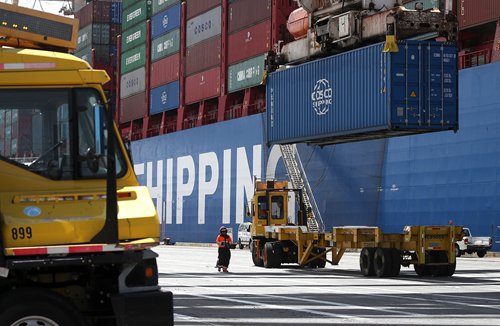China’s FM calls for fair market environment
Escalation of US-China trade conflict has already impacted supply chains across Asia, with a ripple effect that could go all the way back to suppliers in the region, and countries should stand together against protectionist measures, industry representatives said.

A shipping container from the Hong Kong-based CSCL East China Sea container ship offloads cargo at the Port of Oakland on June 20, 2018 in Oakland, California. (Photo: VCG)
Since the trade war began, tariffs imposed by the US have also affected orders for Japan and South Korean companies, an employee at the Institute of Automation under the Chinese Academy of Sciences told the Global Times on Monday.
For instance, an automatic equipment producer that purchases mechanical products from Japanese companies such as Mitsubishi Electric and MISUMI has already seen its output shrink amid the trade war between the world's two largest economies.
"The tariffs on the machines the factory produces have increased from 17 percent to 25 percent. The cost of producing a machine has also increased," said the employee, who preferred not to be identified as the matter is sensitive.
"As the factory needs to purchase some components from Japan and South Korea, the tariff has a certain impact on upstream suppliers," he added.
The US Trade Representative released a list of Chinese products on which the authority has decided to impose an additional 25-percent duty, according to a statement published on its website on June 15. Automated electronic component placement machines for making printed circuit assemblies appeared on the list.
"This trade war scenario will disrupt Asia-Pacific value chains, which may eventually affect the US itself," Dong Yan, a research fellow with the Institute of World Economics and Politics under the Chinese Academy of Social Sciences, told the Global Times.
Some other electronics manufacturers in South China's Guangdong feature this integration of supply chains. An electronics manufacturer surnamed Wang, who is based in Shenzhen, said his company imports more than 200 million yuan ($30.58 million) of radio frequency equipment from Japan and memory chips from South Korea every year, and it exports to countries across Asia, Europe and the US.
As global supply chains are highly integrated, the tariffs imposed by the US may target imports from a certain country, but the consequences will be felt by more producers and suppliers, Dong noted.
The factory purchases components from Japanese and South Korean firms and had been selling products to customers such as Apple and General Motors Corp.
"Asian countries should stand together to fight this protectionist move," Dong said.
Backfire in the end
The Trump administration is also mulling new curbs on Chinese investment and tech exports to China, the Wall Street Journal reported on Sunday.
"We hope that the US can objectively view the business activities of enterprises and create a good, fair and predictable investment environment for Chinese enterprises to carry out local investment activities," Geng Shuang, spokesperson of the Chinese Ministry of Foreign Affairs, said during a press conference on Monday.
In the current global landscape, China-US economic and trade relations cannot be completely decoupled, noted Li Haidong, a professor at the China Foreign Affairs University's Institute of International Relations in Beijing. "These relations will have a huge impact on the world. But what Trump has done shows that he wants to decouple and is not worried about it," Li said.
Aside from its Cold War mentality, the US wants to compete with China in technology, Bai Ming, deputy director of the International Market Research Institute under the Ministry of Commerce, told the Global Times. The US is determined to encircle and suppress Chinese progress in the field of high technology, he said.
"It's not that if we lower our posture and adopt some strategy, the US will let it go," Bai said.
He Weiwen, senior fellow with Center for China and Globalization, said the US is making a strategic error and it will only backfire in the end.


